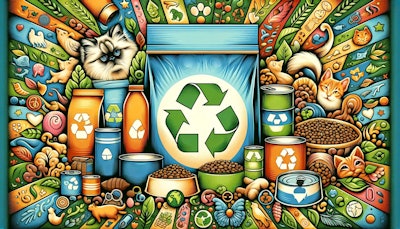
As a pet food producer, it’s natural to want to attract sustainably minded consumers with green or eco-friendly claims on your packaging. Beware of greenwashing, however, that will impact customer loyalty and trust.
Greenwashing – false or misleading claims about a product’s positive environmental impact – is too common in the pet food space. Sarahjane Widdowson, Global Waste Management + Policy Lead at Root, which advises global brands and packaging producers, noted during the recent Pet Sustainability Coalition’s (PSC) webinar, All About Packaging Legislation, that making loosely based environmental claims can harm a brand’s reputation.
“In the UK, there’s been quite a big focus on green claims,” said Widdowson. “They fall under consumer protection law. Companies really need to think about these claims and what they mean, and if consumers truly understand them before making them.”
Hannah Worthington, Policy + Impact Lead at Root, noted there have been a lot of high-profile lawsuits in the U.S. regarding plastic packaging and greenwashing claims. “Take compostable packaging, for example,” Worthington explained. “There’s a lot of talk about biodegradability. In Europe, countries are starting to ban using the word ‘biodegradable.’
“In France, you can't claim anything is biodegradable,” she added. “It must be ‘compostable.’ You also have to say if it's home-compostable or industrially compostable, and it must come with a certification.”
Worthington suggested when making green claims, use the right terminology for the markets that you're in and have evidence to back it up.
“Whether that evidence is a certification, a lab test, whatever it may be – be able to back your claim up,” she said.
Green claims checklist
With its emphasis on green claims, the UK government has supplied The Green Claims Code checklist to guide businesses in complying with consumer protection law. When making a green claim, pet food producers should understand how their product, brand or business has an impact – both positively and negatively – on the environment for its whole life cycle.
When making a green claim, a pet food producer should be able to answer ‘yes’ or agree to each of the following statements:
- The claim is accurate and clear for all to understand.
- There’s up-to-date, credible evidence to show that the green claim is true.
- The claim clearly tells the whole story of a product or service; or relates to one part of the product or service without misleading people about the other parts or the overall impact on the environment.
- The claim doesn’t contain partially correct or incorrect aspects or conditions that apply.
- Where general claims (eco-friendly, green or sustainable for example) are being made, the claim reflects the whole life cycle of the brand, product, business or service and is justified by the evidence.
- If conditions (or caveats) apply to the claim, they’re clearly set out and can be understood by all.
- The claim won’t mislead customers or other suppliers.
- The claim doesn’t exaggerate its positive environmental impact, or contain anything untrue – whether clearly stated or implied.
- Durability or disposability information is clearly explained and labeled.
- The claim doesn’t miss out or hide information about the environmental impact that people need to make informed choices.
- Information that really can’t fit into the claim can be easily accessed by customers in another way (QR code, website, etc.).
- Features or benefits that are necessary standard features or legal requirements of that product or service type, aren’t claimed as environmental benefits.
- If a comparison is being used, the basis of it is fair and accurate, and is clear for all to understand.
Widdowson said green claims are an incredibly hot topic in Europe now with regulators focusing on what brands are claiming and whether consumers understand those claims.
“The global policy space for packaging is an incredibly fast-moving environment,” said Widdowson. “It’s fantastic to see so many pro-environmental policies coming forward, but also frustrating to see so many similar policies being implemented differently depending on which country or state you’re doing business in.
“It’s really important to dive into the details and get a thorough understanding of your compliance obligations to reduce your business risk,” she added. “Brands and producers are on the front lines. More emphasis is being placed on them to take full responsibility for what’s placed on the market.”













